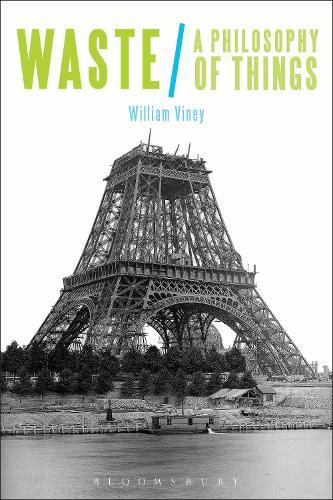Full Product Details
Author: William Viney
Publisher: Bloomsbury Publishing PLC
Imprint: Bloomsbury Academic
Dimensions:
Width: 15.60cm
, Height: 1.80cm
, Length: 23.40cm
Weight: 0.517kg
ISBN: 9781472527578
ISBN 10: 1472527577
Pages: 240
Publication Date: 22 May 2014
Audience:
College/higher education
,
Professional and scholarly
,
Tertiary & Higher Education
,
Professional & Vocational
Format: Hardback
Publisher's Status: Active
Availability: Manufactured on demand

We will order this item for you from a manufactured on demand supplier.
Reviews
If the primary achievement of recent civilization is to produce unprecedented heaps of garbage, what does this tell us about that civilization? In his pleasantly lucid prose style, Will Viney answers this question by providing an ontology, a sociology, and even an art criticism of waste, with special attention to the writings of T.S. Eliot and James Joyce and the visual art of Cornelia Parker and Mark Dion. Graham Harman, Distinguished University Professor, American University in Cairo
This book will convince you that our most complex contemporary ideas about time are at work in the concept of waste. It draws its temporal concepts from many places, from art and literature, philosophy and cultural theory, narrative and the theory of narrative to think about the time of things - things we discard, things we used to use, things we collect, things that fall into ruin, and things that hold the future within them. It animates the theory of things and makes something beautiful out of waste. Mark Currie, Professor of Contemporary Literature, School of English and Drama, Queen Mary, University of London, UK If the primary achievement of recent civilization is to produce unprecedented heaps of garbage, what does this tell us about that civilization? In his pleasantly lucid prose style, Will Viney answers this question by providing an ontology, a sociology, and even an art criticism of waste, with special attention to the writings of T.S. Eliot and James Joyce and the visual art of Cornelia Parker and Mark Dion. Graham Harman, Distinguished University Professor, American University in Cairo
This book will convince you that our most complex contemporary ideas about time are at work in the concept of waste. It draws its temporal concepts from many places, from art and literature, philosophy and cultural theory, narrative and the theory of narrative to think about the time of things - things we discard, things we used to use, things we collect, things that fall into ruin, and things that hold the future within them. It animates the theory of things and makes something beautiful out of waste. * Mark Currie, Professor of Contemporary Literature, School of English and Drama, Queen Mary, University of London, UK * If the primary achievement of recent civilization is to produce unprecedented heaps of garbage, what does this tell us about that civilization? In his pleasantly lucid prose style, Will Viney answers this question by providing an ontology, a sociology, and even an art criticism of waste, with special attention to the writings of T.S. Eliot and James Joyce and the visual art of Cornelia Parker and Mark Dion. * Graham Harman, Distinguished University Professor, American University in Cairo *
Author Information
Author Website: www.williamviney.com
William Viney is Leverhulme Early Career Fellow in the Department of English Studies and Centre for Medical Humanities, Durham University, UK.




